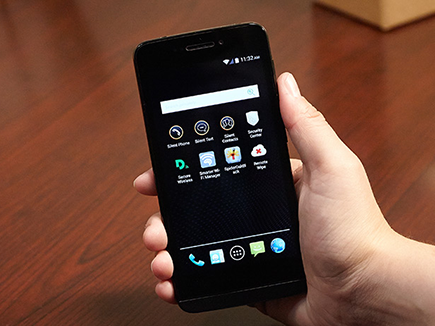Tom's Guide Verdict
The security-oriented Blackphone is a solid handset that makes security and privacy easy, but it comes at the cost of some convenience.
Pros
- +
Top-notch security made easy
- +
Lightweight design
- +
Privacy-optimized operating system
Cons
- -
Limited access to typical apps
- -
Unremarkable performance
Why you can trust Tom's Guide
It sounds like something out of a James Bond movie. But Blackphone, the new privacy-oriented smartphone from Switzerland-based company SGP Technologies, is all about bringing secure technologies out of spy thrillers and into people's everyday lives. The Blackphone combines solid midrange smartphone hardware with a rigorous focus on security and privacy, from the default configurations of its operating system, PrivatOS, to the top-notch messaging, VPN and cloud-storage apps that come preloaded.
As always, gaining security means giving up convenience. Blackphones are meant to communicate with other Blackphones, or at least other phones using the Silent Circle messaging and voice apps. If you want a high degree of privacy and security — and don't have the time or desire to set it up yourself — the Blackphone may be just what you're looking for.
Design
Befitting for a device for users who value privacy, the all-plastic Blackphone is pretty nondescript. The unmarked front of the device features a 4.7-inch display bordered by a glossy, black bezel, with a small chin at the bottom. At the top is a small speaker with a camera to the right.
The back of the Blackphone is nearly as unadorned, but its soft-touch finish and beveled sides make the phone comfortable to hold. An 8-MP camera ringed in silver, with a small LED flash just below, sits toward the top. Near the bottom is a white Blackphone logo and a small speaker.
Along the right side is a power button and volume rocker, and the top edge has a micro USB port and 3.5mm headphone jack.
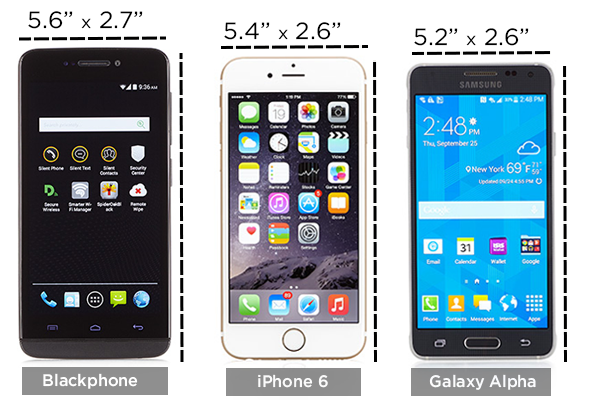
Measuring 5.6 x 2.7 x 0.35 inches, the Blackphone is larger than the Samsung Galaxy Alpha (5.21 x 2.58 x 0.26 inches) and the Apple iPhone 6 (5.4 x 2.6 x 0.27 inches), both of which also have 4.7-inch displays. At 4.2 ounces, the Blackphone is heavier than the Alpha (4.06 ounces), but slightly lighter than the 4.55-ounce iPhone 6.
Security Features
Blackphone's setup process puts security front and center. The setup wizard immediately asks you to set up a screen-lock PIN, which has to be at least five digits long. (The iOS and regular Android PIN default is four digits.) You can also set up an alphanumeric password, which is even more secure.
You'll also be asked to encrypt your device. Regular Android and iOS devices can be encrypted too, but they don't make the process this transparent or easy to access.
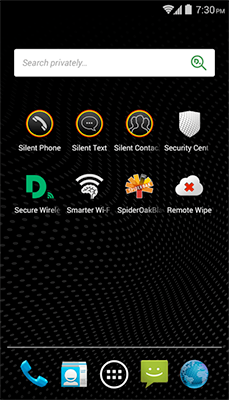
Blackphone comes preloaded with a suite of top-tier security apps, including Silent Phone, Silent Text, Silent Contacts, the encrypted online storage service SpiderOak and two apps from the online-privacy provider Disconnect. Stock Android, phone, texting and contacts apps are also included. (See "Security Apps" for more details.)
SGP Technologies aims to soon add detection and blocking of premium-SMS messages, which are used in marketing campaigns and cyberscams, and can cost phone users money. The company also has a bug-bounty program that pays hackers who find security problems with the phone.
MORE: 20 Free Android Apps for New Users
Blackphone's approach to security is to assume the network is already compromised. In the case of an attack on the phone's baseband processor, for example, attackers who used a malicious cell tower to capture Blackphone's traffic would see only random-looking jumbles of characters, thanks to Blackphone's extensive encryption.
Security Apps
Blackphone comes preloaded with apps for secure messaging, secure calls, encrypted cloud storage and a virtual private network (VPN) for protecting online privacy. Most of these apps, plus their paid service plans, can be had for regular Android and iOS phones, but with the Blackphone, one year's subscription costs for each app — estimated to total $400 total — are included in the cost of the phone.
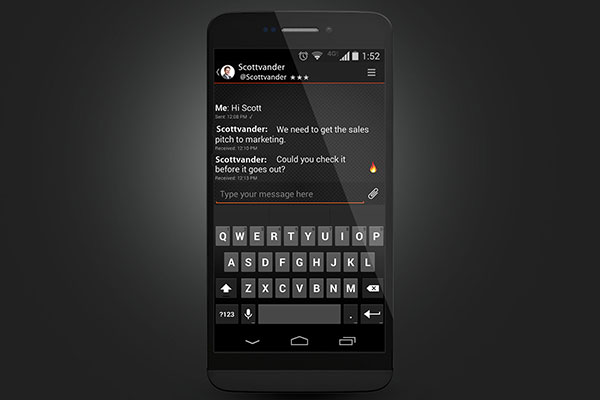
Silent Phone, Silent Text (pictured), Silent Keys and Silent Contacts are developed by Maryland-based secure-communications provider Silent Circle, which jointly makes Blackphone with Spanish phone maker GeeksPhone.
Silent Phone encrypts Internet-based voice and video calls over Wi-Fi or mobile data connections. Silent Text encrypts Internet-based instant messages that can be set to "self-destruct."
MORE: Best Smartphones
Silent Contacts is an encrypted address book, while Silent Keys, aka Silent Circle KeyManager, stores login and security information for other Silent Circle apps. (Silent Circle stopped offering Silent Mail because the company could not guarantee user privacy.)
As far as secure communications go, Silent Circle's offerings are top-notch, providing a strong balance between usability and security. If you want to send and receive secure messaging, you're far better off with Silent Circle than with the likes of Snapchat or WhatsApp.
However, as with all secure-communications apps, Silent Circle products truly work only when both parties to a conversation use them. Secure calls and texts must be sent to and received by other Silent Circle customers.
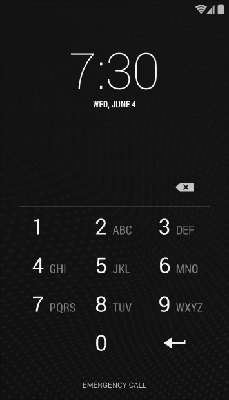
If you make a call with Silent Phone — whether from a Blackphone or another smartphone — your call is fully encrypted from end to end only if you speak with someone also using Silent Phone. If you use Silent Phone to call a regular phone number, the call is encrypted only until it reaches Silent Circle's servers, which decrypt the call and route it into the regular phone network.
Blackphone bundles in three one-year "friends and family" subscriptions to the Silent Circle service — ideal for the secure-communications novice.
Disconnect Secure Wireless accesses a virtual private network (VPN), which adds an extra layer of encryption to Web traffic, while Disconnect Search replaces the Google Search app with a more private service. SpiderOak Black is an encrypted cloud-storage service that substitutes for iCloud, Google Drive, OneDrive or Dropbox.
Blackphone's Smarter Wi-Fi Manager automatically turns off Wi-Fi when you leave a trusted network. The feature prevents the phone from connecting to an unsecured Wi-Fi network, which can glean personal data from a phone.
Finally, Security Center is an interface for learning about and managing Blackphone's built-in security features. Users can switch all privacy settings back to default or set up a Remote Wipe feature, which lets users remotely delete all personal information from the phone. Security Center also lets you modify each app's permissions one by one, which can't be done on most builds of Android.
Most of the apps that comprise Blackphone's security backbone are available in the Google Play store and the Apple App Store. The advantage of Blackphone is that they're all set up and ready to go on the device.
Display
With a resolution of 1280 x 720 pixels, the Blackphone's 4.7-inch screen is similar to that of the Galaxy Alpha (also 1280 x 720p) and the iPhone 6 (1334 x 750p). Measuring 335 nits on ourlight meter, the Blackphone's screen is dimmer than that of the Alpha (371 nits) as well as the iPhone 6 (504 nits), not to mention the category average of 368 nits.
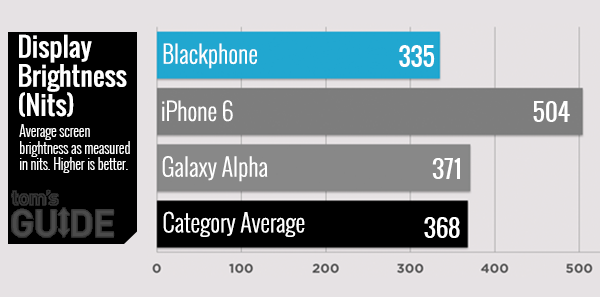
The trailer for Fury looked crisp on the Blackphone's screen; colors, from Brad Pitt's olive-drab uniform to the explosions of tank shells, looked accurate. However, although viewing angles were adequate, they weren't as wide as those on the iPhone 6. Tilt the Blackphone's screen away from you, and it starts to dim considerably. Then again, if you don't want others looking at your phone, this could be considered a feature.
With a Delta-E score of 2.6, the Blackphone's display was more accurate in showing colors than either the Alpha (3.7) or the iPhone 6 (3.6). (Numbers closer to 0 are better.)
Audio
The lone rear-facing speaker on the Blackphone is good for a smartphone. The lower notes in Meghan Trainor's "All About That Bass" were fairly evident, and the song as a whole sounded crisp and clear across all tonal ranges. Lorde's voice on "Royals" came through clearly, but the song as a whole sounded a bit distant, and bass notes could barely be heard.
At 81 decibels (as measured from 13 inches away), the Blackphone was on a par with the smartphone average, as well as the Alpha and the iPhone 6.
Interface
Blackphone uses the default Android KitKat lock screen, displaying the time and date with a large number pad below; if you change your password to one that's alphanumeric, this section will change accordingly. You can't, however, select a pattern lock, a slide or no lock at all; those options were grayed out on our review model.
The home screen is a pretty vanilla version of Android 4.4.2; persistent icons for the stock Android Phone, People/Contacts, Apps, Messaging and Browser sit at the bottom, with status icons at the top. Swiping down from the top shows recent notifications and lets you access quick settings.
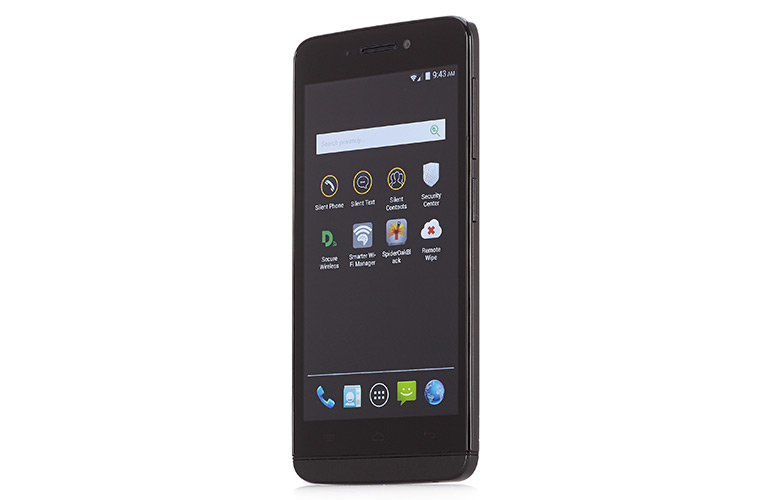
Instead of the standard Google search bar in the center of the home screen, however, Blackphone's search bar leads instead to Disconnect Search, which blocks Internet service providers and search engines from tracking your activities.
MORE: Android 5.0 Top Features
Standard Android touch-sensitive buttons for Settings, Home and Back are in the bezel at the bottom of the display. We liked that these buttons buzz with haptic feedback when pressed, but they disappear after a few seconds, and there's no way to keep them illuminated indefinitely.
Other Included Apps
As part of Blackphone's privacy measures, there's no app store, from Google or anyone else, installed on the phone. Apps can be sideloaded from a PC. The browser-based Amazon App Store is another way to go.
Also not included on the Blackphone are Gmail, Chrome, Maps or other Google-branded apps. Unlike most Android devices sold in the United States, there's no Google account required to use the Blackphone; you'll gain a huge amount of privacy in return for a bit of inconvenience.
However, the stock Android Email and Browser apps are preinstalled, along with other apps from the Android Open Source Project (AOSP), including Calculator, Calendar (not Google Calendar), Camera, Clock, Gallery, Messaging, Music (not Google Play Music), People, Phone and Search. (The latest version of PrivatOS, not included in our review model, replaced the AOSP Email app with a specialized, but not encrypted, build of the open-source K-9 email app.)
If you do have a Google account, it's easy to use the stock Android browser to access the user-friendly Gmail/Google Calendar mobile Web interface.
Performance
Featuring a 2-GHz Nvidia Tegra 4i Processor with 1GB of RAM, the Blackphone delivers midtier performance.
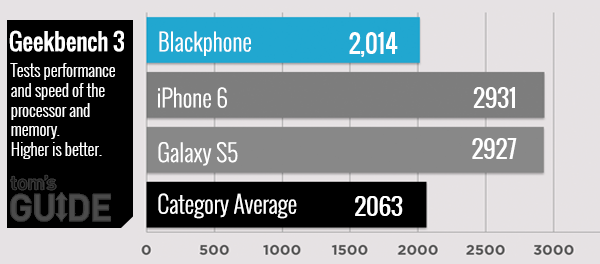
On Geekbench 3, which measures overall performance, the Blackphone's score of 2,014 was just below the average of 2,063, and about 1,000 points below that of the iPhone 6 (2,931) and the Samsung Galaxy S5 (2,927).
Transcoding a 203MB 1080p movie to 480p took 6 minutes and 25 seconds on the Blackphone, which is more than a minute faster than the smartphone average (7:43), but more than 2 minutes longer than the Galaxy S5 (5:07).
Camera
The Blackphone features a 5-MP front camera and an 8-MP rear camera with high-dynamic-range (HDR) imaging. It can also shoot 1080p video.

The camera app's features are decent, with options including lighting autocorrection, picture size, a countdown timer, anti-flicker, time-lapse video, white balance and image stabilization. If you restore default settings, the camera app prompts you to choose whether location information should be embedded in each image — a potential privacy pitfall.
The camera's autoexposure varies greatly depending on where it's focused. Photos taken with the Blackphone on a Manhattan street were crisp and clear, but the HDR images had much better exposure and sharper architectural lines (although fast-paced pedestrians looked even more blurred).

Selfies we took with the front-facing camera were far less crisp, though they delivered decent detail and color balance.
In a video of New York City traffic, a small amount of wobbling was visible due to the camera's refocusing. The autoexposure caused the colors to fluctuate between light and dark as cars of different colors passed by.
Battery Life
The 2,000-mAh battery on the Blackphone lasted 7 hours and 40 minutes on the Tom's Guide Battery Test (Web surfing via T-Mobile 4G).
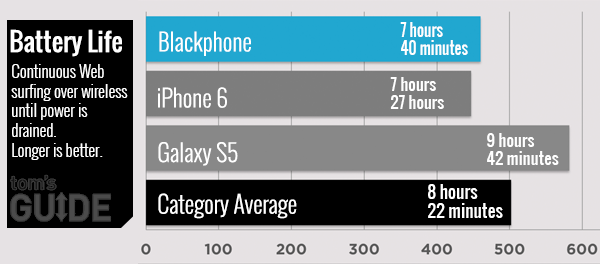
That's less than the smartphone average of 8:22, but very close to the Samsung Galaxy Alpha's 7:37.
MORE: Smartphones with the Longest Battery Life
The iPhone 6 did slightly worse, at 7:27, but the Galaxy S5 lasted a much longer 9:42.
Bottom Line
Is Blackphone as convenient as a "regular" smartphone, such as a Samsung or an iPhone? No — you can't get Google apps, and your messages and calls are secure only if you're communicating with other Silent Circle users. By the same token, security experts may also want to forgo the Blackphone because all the security features and apps can be obtained for other phones, and skilled users can configure all the intricacies for themselves.
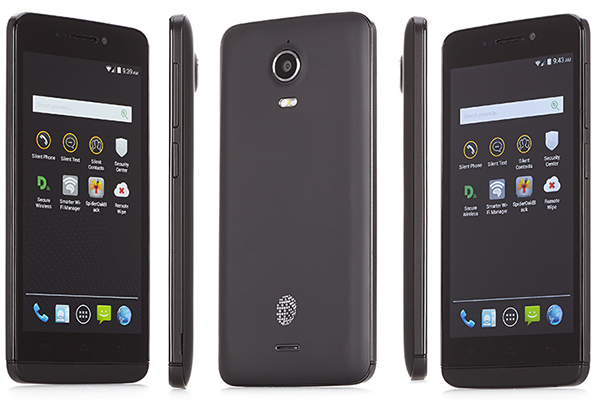
But SGP is targeting neither casual smartphone users nor security experts. Blackphone is a phone for the average security-minded (some might say paranoid) person who wants to keep personal data secure and private, but doesn't want to spend hours working out the requisite complexities that modern mobile security requires.
In that area, Blackphone is competing with several other secure smartphones that can cost up to thousands of dollars. Journalists, high-stakes businesspeople, international travelers and people who want affordable privacy from their mobile devices will absolutely want to check out Blackphone.
- Best and Worst iOS 8 Keyboards
- 10 Best Yoga Apps
- 40 Best Free Apps for iPhone
Email jscharr@tomsguide.com or follow her @JillScharr and Google+. Follow us @TomsGuide, on Facebook and on Google+.

Michael A. Prospero is the U.S. Editor-in-Chief for Tom’s Guide. He oversees all evergreen content and oversees the Homes, Smart Home, and Fitness/Wearables categories for the site. In his spare time, he also tests out the latest drones, electric scooters, and smart home gadgets, such as video doorbells. Before his tenure at Tom's Guide, he was the Reviews Editor for Laptop Magazine, a reporter at Fast Company, the Times of Trenton, and, many eons back, an intern at George magazine. He received his undergraduate degree from Boston College, where he worked on the campus newspaper The Heights, and then attended the Columbia University school of Journalism. When he’s not testing out the latest running watch, electric scooter, or skiing or training for a marathon, he’s probably using the latest sous vide machine, smoker, or pizza oven, to the delight — or chagrin — of his family.
